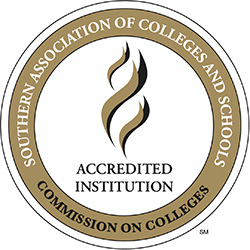Alignment With Standards
Quality Assurance System Educator Preparation Programs
III. Alignment of Conceptual Framework and Programs with Standards CAEP: Standard 1.1, A.1

Initial Programs
The conceptual framework is closely aligned with the Interstate New Teacher Assessment and Support Consortium (InTASC) Model Core Teaching Standards, which influence the planning of initial teacher preparation programs. Initial programs are geared toward developing high levels of proficiency among beginning teachers. The faculty recognizes that InTASC Standards provide common ground for cross-program planning and assessment of candidates. The relationship of InTASC standards to individual program goals, the latter sensitive to and/or derived from the guidelines of specialty organizations, is made clear in a series of analytical matrices in individual program reports and in the assessment instrument used to evaluate teacher candidate performance. The assessment instrument, the Model of Appropriate Practice (MAP) for teacher candidates, was created by the educator preparation faculty in academic year 2000-2001. The MAP assessment continues to be revised for continuous improvement of programs and as standards and regulations mandate. This assessment outlines the skills beginning teachers should demonstrate and is aligned with InTASC Standards.
*Council for the Accreditation of Educator Preparation (CAEP), Standard 1.1
Advanced Programs
Advanced educator preparation programs in the COEHP and COA are influenced by national standards appropriate to each program. In teacher education, the National Board of Professional Teaching Standards (NBPTS) core propositions and specialty association standards serve to shape decisions regarding advanced programs. The NBPTS propositions not only define accomplished teaching, but also influence initial programs which are based on the idea that candidates move through identifiable stages toward increasingly higher levels of performance, toward accomplished teaching which distinguishes board-certified professionals. The specialty association standards are highly influential in planning each individual program, both initial (for example, elementary, science education, and other majors) and advanced. The School Counseling program is influenced by the Council for Accreditation of Counseling and Related Educational Programs (CACREP) Standards and American School Counselor Association (ASCA) National Standards while the Educational Leadership programs are guided by the Professional Standards for Educational Leaders (PSEL) and the 2018 Georgia Educational Leadership Standards. The conceptual framework is closely aligned with the standards in each of these areas.
Accrediting Organizations
-
Columbus State University is accredited by the Southern Association of Colleges and Schools Commission on Colleges (SACSCOC) to award associate, nexus, baccalaureate, masters, educational specialist, and doctorate degrees. Columbus State University also may offer credentials such as certificates and diplomas at approved degree levels. Questions about the accreditation of Columbus State University may be directed in writing to the Southern Association of Colleges and Schools Commission on Colleges at 1866 Southern Lane, Decatur, GA 30033-4097, by calling (404) 679-4500, or by using information available on SACSCOC's website (www.sacscoc.org).

- Educator Preparation “Initial Certification” at Columbus State University is accredited by the National Council for Accreditation of the Teacher Education (NCATE) and initial programs approved by the Georgia Professional Standards Commission (GaPSC). July 1, 2013 marked the de facto consolidation of NCATE and Teacher Education Accreditation Council (TEAC) into the Council for Accreditation of Educator Preparation (CAEP) as the new accrediting body for educator preparation. The Columbus State University CAEP Site Review is scheduled for Spring 2021.
- The Special Education Programs, both undergraduate and graduate, are accredited by the Council for Exceptional Children (CEC). http://www.cec.sped.org
- The baccalaureate degree program in nursing is approved by the Georgia Board of Nursing and accredited by the Commission on Collegiate Nursing Education.
- The Georgia Professional Standards Commission (GaPSC) approves all Columbus State University educator preparation programs that lead to certification in teaching, counseling, and educational leadership.
- The Master of Education in School Counseling and the Master of Science in Clinical Mental Health Counseling degree programs are accredited by the Council for the Accreditation of Counseling and Related Educational Programs (CACREP).
- Columbus State University is an accredited institutional member of the National Association of Schools of Art and Design (NASAD).
- Columbus State University is an accredited institutional member of the National Association of Schools of Theatre (NAST).
- Columbus State University is an accredited institutional member of the National Association of Schools of Music (NASM).
Alignment of Conceptual Framework with InTASC Standards and NBPTS Standards
Learning Outcomes - Teaching
- Teachers employ best practice that leads to improved student learning. (InTASC Standards 1, 2, 3, 4, 5, 6, 7, 8; NBPTS Standards 1, 2, 3)
- Teachers use technology to enhance teaching and learning (InTASC Standards 4, 7, 8; NBPTS Standards 1, 2, 3)
- Teachers use a variety of tools and strategies to address the needs of diverse learners (InTASC Standards 1, 2, 6, 8; NBPTS Standards 1, 2, 3)
- Teachers continually reflect on their practice (InTASC Standard 9; NBPTS Standard 4)
- Teachers collaborate within communities of learning (InTASC Standard 10; NBPTS Standard 5; CACREP School Standard B)
- Counselors and leaders create and maintain safe and supportive school environments that promote accomplished teaching and high levels of learning (CACREP School Standard A)
- Counselors improve student learning by promoting the academic, career, and social development of students (ASCA Standards I, II, III)
Learning Outcomes - Scholarship
- Teachers, counselors, and leaders know their fields and are able to apply their knowledge to help students learn (InTASC Standards 1, 2, 3, 4, 5, 6, 7, 8; NBPTS Standards 1, 2, 3; CACREP School Standard A)
- Teachers, counselors, and leaders continually construct, examine, and reflect upon knowledge and use that knowledge to improve teaching and learning (InTASC Standard 9; NBPTS Standard 4)
- Teachers, counselors, and leaders are members of multiple learning communities (InTASC Standard 10; NBPTS Standard 5; CACREP School Standard B)
- Teachers, counselors, and leaders understand and build upon the diversity of students, families, and communities (InTASC Standards 2, 5, 10; NBPTS Standard 1; CACREP School Standard A)
Learning Outcomes - Professionalism
- Teachers, counselors, and leaders know and can explain important principles and concepts delineated in professional, state, and institutional standards (InTASC Standards 1, 2, 3, 4, 5, 6, 7, 8, 9, 10; NBPTS Standards 1, 2, 3, 4, 5)
- Teachers, counselors, and leaders can apply professional and pedagogical knowledge and skills delineated in professional, state, and institutional standards to facilitate student learning (InTASC Standards 1, 2, 3, 4, 5, 6, 7, 8, 9, 10; NBPTS Standards 1, 2, 3, 4, 5)
- Teachers, counselors, and leaders reflect the dispositions delineated in professional, state, and institutional standards (InTASC Standards 9, 10; NBPTS Standards 1, 2, 3, 4, 5)
- Teachers, counselors, and leaders are members of learned societies and professional organizations (InTASC Standards 9, 10; NBPTS Standards 5)
- Teachers, counselors, and leaders focus on student learning (InTASC Principles 1, 2, 3, 4, 5, 6, 7, 8, 9, 10; NBPTS Standards 1, 2, 3, 4, 5; CACREP School Standard A)